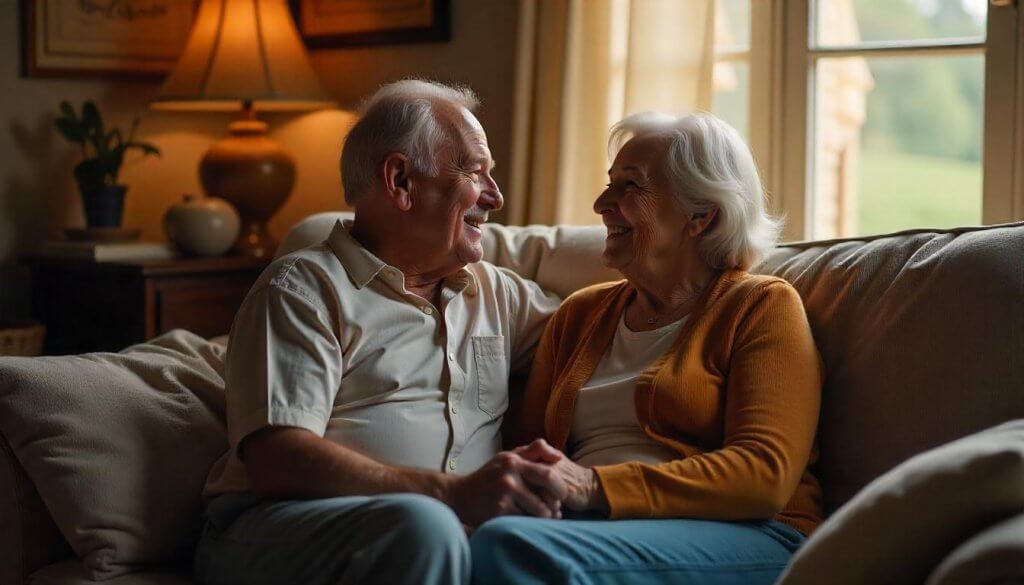The ideal of lifelong love, enduring romance, and unwavering partnership remains a universal aspiration. However, transforming this ideal into reality requires active effort, particularly as years turn into decades and couples navigate the inevitable changes of life. For aging gracefully couples, the journey involves more than just growing older side by side. It means intentionally nurturing their connection, adapting to new phases, and strengthening their bond through all of life’s transitions.
Indeed, societal narratives often focus on the challenges of aging, yet they often overlook the profound beauty and wisdom that comes with a shared lifetime. Couples who age gracefully together discover new layers of intimacy, deepen their understanding of each other, and become pillars of mutual support. This article will explore practical strategies for sustaining love, joy, and a vibrant connection through the later stages of life. It will highlight how proactive choices can transform the aging process into an enriching shared adventure.
The Foundation of Lasting Love
Achieving the status of aging gracefully couples relies on fundamental principles established early in a relationship and consistently maintained. Love, as a result, is not a static destination but a dynamic process that requires ongoing work.
At the core lies communication. Open and honest dialogue forms the bedrock of a strong relationship. Partners must feel safe to share their thoughts, fears, and desires without judgment. This involves active listening, truly hearing what the other person expresses, and offering empathy. Effective communication also means resolving conflicts constructively, rather than letting resentments fester. When partners can openly discuss issues, they build trust and prevent minor disagreements from escalating.
Furthermore, mutual respect and appreciation are vital. Partners must value each other’s opinions, choices, and individuality. Expressing gratitude for small gestures and acknowledging each other’s contributions strengthens the bond. This continuous appreciation helps to keep the spark alive and reminds each person of their value within the partnership. Shared values and goals also provide a critical foundation. When couples align on fundamental beliefs about life, family, and the future, they create a cohesive vision that guides them through challenges. This shared purpose provides a sense of unity and direction.
Navigating Life’s Transitions Together
Life is a series of transitions, and aging gracefully couples learn to navigate these shifts as a united front. Each new phase presents unique challenges and opportunities that can either strain or strengthen the relationship.
One significant transition is the shift from active careers to retirement. This change impacts daily routines, financial stability, and personal identity. Couples must adapt to spending more time together, finding new shared hobbies, and potentially redefining their individual purposes outside of work. Open discussions about expectations for retirement are essential to avoid friction.
Another major phase is Empty Nest Syndrome. When children leave home, parents often rediscover their couplehood. This can be a joyful time for rekindling intimacy and shared interests. However, it can also expose underlying issues that were previously masked by the demands of parenting. Therefore, focusing on rebuilding the partner relationship becomes paramount.
Health challenges are an inevitable part of aging. Couples must learn to support each other through illness, manage caregiving roles, and adapt to physical limitations. This period often tests a couple’s resilience and compassion. Partners become each other’s primary caregivers and emotional anchors. Moreover, coping with the loss of loved ones, such as parents or friends, requires immense emotional support. Couples who grieve together and lean on each other strengthen their bond through shared sorrow. Throughout these transitions, resilience and adaptability as a team are crucial for maintaining a strong and healthy partnership.
Nurturing Intimacy in Later Years
Intimacy often evolves as couples age, moving beyond purely physical expressions to encompass deeper emotional, intellectual, and recreational connections. Aging gracefully couples understand this evolution and actively work to nurture all forms of intimacy.
Emotional intimacy deepens through continued vulnerability and shared experiences. Partners feel safe to share their innermost thoughts and feelings, knowing they will receive understanding and acceptance. This ongoing emotional connection is the bedrock of lasting love. Intellectual intimacy involves engaging in stimulating conversations, learning from each other, and exploring new ideas together. This keeps the relationship fresh and intellectually stimulating.
Recreational intimacy centers around shared activities and hobbies. Participating in activities together, whether it’s gardening, reading, or watching movies, creates shared joy and memories. It’s about enjoying each other’s company in meaningful ways. Physical intimacy, while it may change, remains important. It adapts to new needs and desires. Affectionate touch, holding hands, cuddling, and sensual exploration continue to foster closeness and comfort. Couples should openly discuss their evolving physical needs and desires.
Finally, shared laughter and playfulness are invaluable. Humor lightens the mood, reduces stress, and strengthens bonds. The ability to laugh together, even through difficult times, is a hallmark of enduring relationships. Continuing to prioritize these different facets of intimacy ensures a vibrant and fulfilling partnership in later life.
Shared Activities and Continued Growth
Lifelong learning and shared activities are vital for aging gracefully couples. These pursuits keep the mind engaged, the spirit curious, and the relationship dynamic.
Couples can embark on new learning journeys together. This might involve taking a class in a new language, learning a musical instrument, or exploring a new hobby like painting or ceramics. These shared learning experiences create new memories and foster mutual growth. Travel and adventure, within personal limits, also offer rich opportunities. Visiting new places, even local ones, provides fresh perspectives and exciting experiences that you can share. This adds new chapters to your shared story.
Furthermore, engaging in community service or volunteering together can provide a profound sense of shared purpose. Contributing to a cause greater than yourselves strengthens your bond and brings meaning to your later years. This allows couples to connect with others and give back. Individual growth is also important. While shared activities are beneficial, partners should also support each other’s personal aspirations. Encouraging individual hobbies and personal development ensures both partners remain well-rounded and fulfilled. This balance between togetherness and individuality fosters a healthier, more dynamic relationship.
The Power of Positive Mindset and Gratitude
A positive mindset is a powerful tool for aging gracefully couples. It helps them navigate challenges and appreciate the beauty of their shared journey.
Focusing on what works, rather than dwelling on what might be lost, fosters contentment. This involves actively appreciating the good aspects of the relationship and the joys of everyday life. Practicing gratitude for the partnership is a daily exercise. Expressing thanks for each other’s presence, support, and love reinforces positive feelings. This can be as simple as a heartfelt “thank you” or a reflective moment of appreciation.
Humor and lightheartedness are also invaluable. The ability to laugh at life’s absurdities and maintain a playful spirit can alleviate stress and deepen connection. It’s important not to take everything too seriously. Accepting imperfections in oneself and one’s partner is another crucial aspect of a positive mindset. No relationship is perfect. Embracing flaws and practicing forgiveness creates a more compassionate and understanding bond. A positive outlook doesn’t ignore difficulties but empowers couples to face them with optimism and grace.
Managing Conflict Constructively
Even the most harmonious aging gracefully couples experience conflict. The key is not to avoid disagreements, but to manage them in a way that strengthens the relationship.
Healthy conflict resolution strategies are essential. This involves active listening, avoiding blame, and focusing on solutions rather than just problems. Partners should express their needs clearly and calmly. They should also be willing to compromise. The goal is to reach a mutual understanding and a resolution that benefits both individuals and the relationship.
Forgiveness and letting go are also critical. Holding onto grudges or past hurts can erode intimacy over time. Learning to forgive, both oneself and one’s partner, allows couples to move forward with a renewed sense of connection. Empathy and understanding different perspectives are vital skills. Trying to see the situation from your partner’s point of view fosters compassion and reduces defensiveness. These practices transform potential conflicts into opportunities for growth and deeper understanding.
Building a Support Network
Even for the most self-sufficient aging gracefully couples, a strong external support network is invaluable. Friends and family offer emotional support, companionship, and different perspectives.
Connecting with other couples who are also navigating later life stages can provide a sense of community and shared experience. These relationships offer opportunities for social engagement, mutual advice, and fun. They can also serve as role models, showing how others are successfully growing old together.
Sometimes, external professional help is beneficial. If conflicts become overwhelming, or if one partner struggles with significant emotional challenges, seeking counseling or therapy can provide tools and guidance. A neutral third party can help couples communicate more effectively and resolve deep-seated issues. This proactive step shows a commitment to the health and longevity of the relationship.
Leaving a Legacy Together
The journey of aging gracefully couples is not just about their own shared experience. It also involves the legacy they leave for future generations. Their enduring love and wisdom serve as a powerful example.
Couples can actively pass on shared values and life lessons to their children, grandchildren, and wider community. They become role models for enduring partnership, resilience, and happiness in later life. Their shared history becomes a source of inspiration, demonstrating that love can indeed last forever. The beauty of a shared history, built over decades, is a profound testament to their commitment. It is a legacy woven from countless moments, both big and small, that shapes not only their lives but also the lives of those around them.
Conclusion
The journey of aging gracefully couples embodies resilience, intentionality, and enduring love. It’s a path that requires continuous effort, open communication, and a willingness to adapt to life’s inevitable changes. From navigating career shifts and empty nests to nurturing intimacy and managing conflict, each challenge presents an opportunity to strengthen the bond.
Ultimately, by actively choosing to prioritize their partnership, embracing a positive mindset, and building a supportive community, couples can transform the aging process into a truly enriching and beautiful shared adventure. The profound beauty of a lifelong partnership, growing older together, stands as a testament to the power of love that truly lasts forever.













